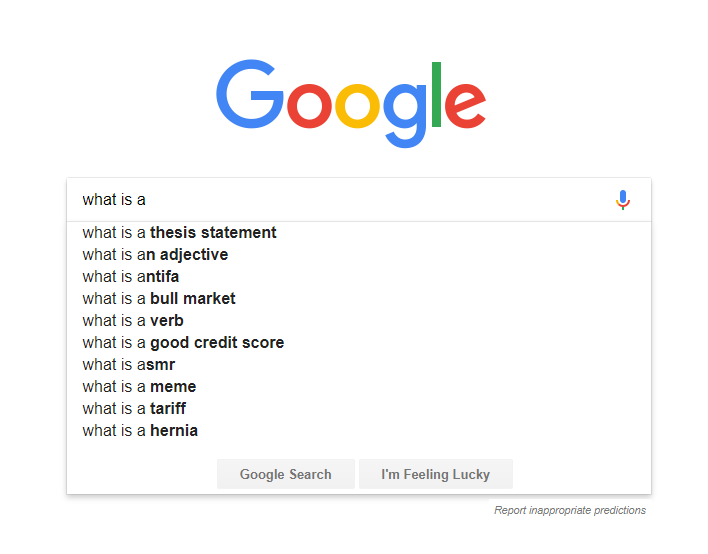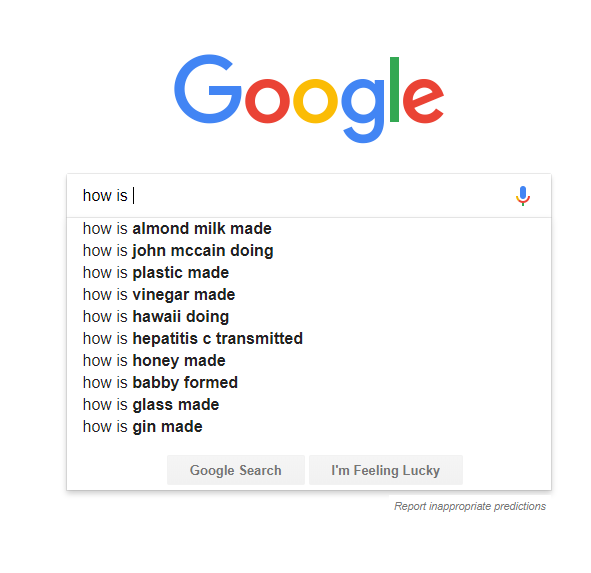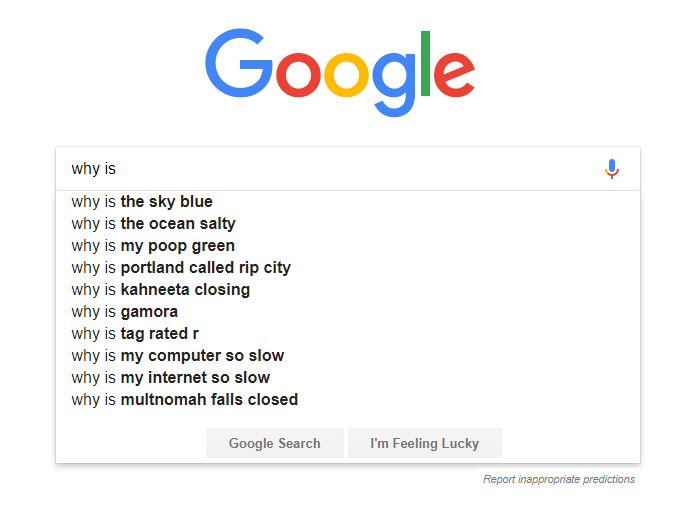
So. I am starting a series on my blog. You’ll catch on pretty quickly as to how it works so I won’t bother explaining it. Anyway, I’m bad at introductions so let’s just jump right in.
The First: what is a thesis statement?
The internet’s burning question is academic, either that or Google’s secret service knows me pretty well. Whether it is actually the top “a” question or not doesn’t matter to me as this series is all about artificial, computer-generated lists so I might as well just stick to my plan and answer the question.
According to my literal actual super-heavy dictionary, a thesis is “a proposition that is maintained by argument.” At least that’s the definition that I understand; there’s a bunch more about “metrical feet” and whatnot. Let’s stick to the first one. A thesis statement would then have to be a statement that has a thesis in it. Tada! We’re done.
Wait, should I explain the dictionary definition at all? I shouldn’t? Oh well, too late. To put it simply, the thesis is the main question of a paper. It’s the whole reason you’re writing a paper (other than the reason that it was almost certainly assigned to you by a teacher). When you write a thesis, you want it to be as concise as the definition of “thesis” was, if possible. That definition has seven words. Seven. That’s super concise. All of your theses statements should be concise. They should also be complete, though. Your thesis statement needs to fully lay out the question that you are answering. Also, it’s incredibly important for you to use the word “teeth” in your thesis statement. Don’t ask why. You’ll learn when you become a true writer. All true writers use the word “teeth” a lot.
The Second: what is an adjective?
Okay so to be completely honest I don’t know the answer to this one. I never liked grammar in school so I didn’t learn any of it. I managed to answer the “thesis statement” without doing any googling, but I don’t think I can do that with this one. *sigh* I feel like an idiot.
We pause for some brief Google-ing.
Right! I remember. An adjective describes stuff. It’s a word you use to make other words fit reality better. Like if I’m talking about a mouse, versus talking about a massive, pink mouse. Both ways could be describing the same thing, but one of them generates a very different and much more specific mental picture. In related news: I have a newfound fear of massive, pink mice after that mental picture game.
The Third: what is antifa?
If you are a reasonably intelligent reader, this is probably the first one that might actually be something you don’t already know about. (If you also didn’t know what an adjective was, then I appreciate you and I think you’re lying). This one is also going to take some research on my part.
Short answer: Antifa is short for “anti-fascist.”
Less short answer: Antifa is short for “anti-fascist and also really aggressive about it”
Longer answer: Antifa is a term used to describe a bunch of far-left extremists and extremist groups who use violence and other means of intimidation to harass people who they view as fascist or racist.
The Fourth: what is a bull market?
I have absolutely no clue.
My first thought was a bunch of cows selling drugs out behind the barn.
It turns out I was not correct.
A bull market is actually a financial term referring to a market that people like. That is to say, it is a market in which prices are expected to go up, usually describing the stock market.
I’m not sure what that has to do with bulls, however…
Okay I have answered that question as well. It seems the two kinds of markets are a bull and a bear, named this because of how they attack things? The bull attacks things by thrusting up with its horns, and the bear attacks things by swiping down with its paws. This apparently was a sound enough analogy for economists to name their whole system either a bull (going up) or a bear (going down). I also understand the game of Pit much better now.
The Fifth: what is a verb?
Once again. No clue. I really should have learned these things.
Got it. It’s an action. Or a state. Or an occurrence. I don’t really understand those second two, but that hasn’t stopped me from explaining anything thus far. An “action” is doing a thing, like “The pig flies, despite what people say about him.” In this sentence, the verb is “flies” because that is what the pig is doing. I have Googled the second and third ones as well. A “state” would be like “The pig is clearly living his best life now.” In this case, the state verb is “is” because that’s the way the pig exists at the moment. Lastly, an occurrence: “The pig became a better pig as a result of flying above people’s expectations.” In this sentence, “became” is an occurrence, because it marks how the pig is now a better pig. Good little piggy. Now go to the bull market.
The Sixth: what is a good credit score?
So far the main takeaway from this project for me has been that I don’t really know anything at all. I mean, I think you want high numbers? Higher numbers are good?
Yes. I was right this time. Big numbers are good. But not too big. If your credit score is 11,904 then you’re looking at the wrong number. Credit scores are on a scale from 300-850, and a good one would be from around 670 on up for FICO and 700 on up for VantageScore.
Okay, that question answered. My question, though is, why on earth does the scale go from 300-850? What makes those number special?
After some serious Google research, I still cannot find out why it is beyond that it is somehow related to how they calculate the scores. If anyone reads this and knows why it ranges through those specific values, please tell me; I’m very curious now.
The Seventh: what is asmr?
Clearly an acronym.
ASMR stands for Autonomous Sensory Meridian Response. It’s apparently some weird tingling on the skin that goes from your scalp down your neck to your upper back? This sounds super sketch. Wikipedia says that there were other names proposed that were not chosen, one of which is “brain orgasm,” which leads me to believe that this weird tingling is apparently something good and/or enjoyable.
It is apparently often triggered by whispering or other soft, relaxing sounds. So that sounds nice. Maybe I should try this thing. I just have to find someone to whisper soothing things in my ear. Unfortunately, I don’t trust anyone not to yell in my ear.
The Eighth: what is a meme?
Oh boy.
If you’re talking like a smart person, a meme is a piece of culture that is passed from one person to another, generally through nongenetic means.
If you’re talking like a slightly more normal human being, a meme is an idea with a loosely set meaning that is passed around the internet (Reddit, Twitter, Tumblr, etc.), constantly being changed or used to communicate varying ideas within the same somewhat relatable structure.
If you’re talking like an internet person, a meme is probably your life’s work.
The Ninth: what is a tariff?
It’s a tax, either on stuff we’re getting or on stuff we’re sending. It’s a way for the government to make certain things harder to buy (like maybe aluminum and steel imports) because those things get more expensive.
It’s also a weapon that a president can use to engage in a trade war with other countries when they want to. This is not always a good idea.
The Tenth: what is a hernia?
I assume it is painful, but I do not know what it is.
Ah. I have learned what it is and the pictures are gross.
Basically, a hernia seems to be when part of your insides tries to go to the wrong part of your body. Which sounds horrible.
It doesn’t seem to be a huge problem, though, it usually just causes a lot of pain. No worries there.
Doctors can treat it by, I assume, putting the insides back where they go? I guess? Sure. I’m sticking with that theory.
The End: what did I just read?
Thanks for making it to the end of this presumably boring blog post. I just wanted to learn more about stuff and so I figured that this would be a great way to do that. Hopefully, you learned about stuff as well. If you have any questions that you would like answered, don’t hesitate to send me a message on the message thing.



